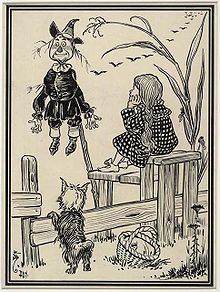- Juvenile fantasy
-
Fantasy Fantasy media
- Fantastic art
- Fantasy anime
- Fantasy art
- Fantasy artists
- Fantasy authors
- Fantasy comics
- Fantasy fiction magazine
- Fantasy films
- Fantasy literature
- Fantasy television
- Fantasy webcomics
Genre studies
- History of fantasy
- Fantastic
- Fantastique
- Fantasy tropes
and conventions - Fantasy races
- Fantasy worlds
- Legendary creatures
- Lovecraftianism
- Magician
- Magic
- Religious themes
- Tolkienology
Categories
- Fantasy
- Fantasy awards
- Fantasy subgenres
- Fantasy television
- Fantasy tropes
Juvenile fantasy is children's literature with fantasy elements: fantasy intended for readers not yet adult.
The protagonists are usually children or teens who have unique abilities, gifts, possessions or even allies that allow them to face powerful adversaries. Harry Potter is the powerful young wizard, one of the children of The Dark Is Rising series is an immature Old One with magical abilities, and in the His Dark Materials series the children have magical items and animal allies. The plot frequently incorporates a bildungsroman.
In the earlier part of the 20th century, C. S. Lewis noted that fantasy was more accepted in juvenile literature, and therefore a writer interested in fantasy often wrote in it to find an audience.[1]
Contents
Juvenile fantasy books and series
Forerunners
- Charles Kingsley: The Water-Babies
- George MacDonald: The Princess and the Goblin, The Light Princess, At the Back of the North Wind
- Lewis Carroll: Alice's Adventures in Wonderland, Through the Looking-glass
1900 to 1945
- L. Frank Baum: The Wonderful Wizard of Oz and its many sequels
- E. Nesbit: Five Children and It, The Phoenix and the Carpet, The New Treasure Seekers, The Story of the Amulet, The Enchanted Castle
- J. R. R. Tolkien: The Hobbit
- Antoine de Saint-Exupéry: The Little Prince
Post-War and 1950s
- C. S. Lewis: The Chronicles of Narnia
- Robert A. Heinlein, the Heinlein juveniles, a set of 12 books that includes Starship Troopers
- T. H. White, The Sword in the Stone and Mistress Masham's Repose
Late 20th Century
- Susan Cooper: The Dark Is Rising
- Roald Dahl: Charlie and the Chocolate Factory, James and the Giant Peach, Matilda, The BFG and others
- Alan Garner: The Weirdstone of Brisingamen, The Owl Service
- Andre Norton: the Witch World series
- Mary Norton: The Borrowers series
- Ursula K. Le Guin: A Wizard of Earthsea and its sequels
- Brian Jacques: the Redwall series
- Anne McCaffrey: the Dragonriders of Pern series
- Madeleine L'Engle: the Time Quartet
More recent titles and series
- Philip Pullman: His Dark Materials, Clockwork and The Firework-Maker's Daughter
- J. K. Rowling: Harry Potter
- Holly Black and Tony DiTerlizzi: The Spiderwick series
- Cornelia Funke: The Thief Lord, Inkheart trilogy, Dragon Rider
- Mary Pope Osborne: The Magic Tree House series
- Tamora Pierce: The Song of the Lioness, Circle of Magic, and sequels
- Christopher Paolini: Eragon
- Angie Sage: Septimus Heap
- Erin Hunter : Warriors & Seekers series
References
- ^ C.S. Lewis, "On Juvenile Tastes", p 41, Of Other Worlds: Essays and Stories, ISBN 0-15-667897-7
Categories:- Fantasy genres
Wikimedia Foundation. 2010.

